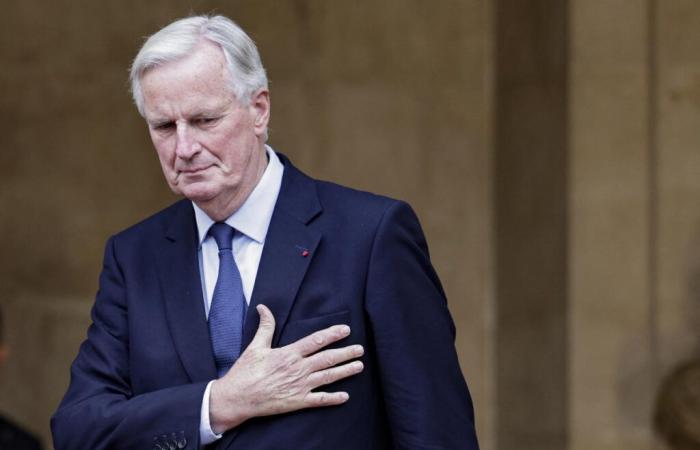The Internet has a memory, and Michel Barnier could probably have done without it. In recent years, Michel Barnier has enriched his website, “Michel-Barnier.fr” with several notes written on different themes, to share his vision of things, mainly between the LR primary campaign in 2021, and the presidential election of 2022.
If the new Prime Minister’s website is now unavailable, the Internet has not forgotten. A site offers to go back in time and find Internet pages that have now disappeared or been deleted, by archiving them at a certain frequency.
Notes written in 2021 and 2022, before the presidential election
The tool, called the Wayback Machine, was used by Internet users who dug up some blog posts that have now disappeared and were written by Michel Barnier, and questioned him about its content.
He denounces “the establishment of a real culture of welfare”
In these notes, which can be consulted here and date from the period 2021-2022, i.e. the period between the right-wing primary and the presidential election, Michel Barnier, in no particular order, wishes the French a happy national holiday, details various trips, supports Valérie Pécresse during the 2022 presidential election, but also addresses more political subjects: working hours, pensions and unemployment insurance.
In a note entitled “rediscovering the honour of work”, he points out the “battering blows (…) dealt to work, from the overtaxation of wages to the establishment of a real culture of welfare”, which he illustrates with the reduction of working time to 35 hours per week, “but also the chimeras of a world without work where everyone would live on a universal income”, advances that he describes as “not only a burden on the economy: they are antithetical to French culture”.
His charge against “the RSA and so many social benefits”, which “lock people into a kind of social marginality”
“It is urgent to change the model,” argues the now Prime Minister, who believes that “our social system (…) must encourage work.” For example, he targets “the RSA and so many social benefits,” which according to him “too often lock people into a kind of social marginalization,” and proposes the establishment of “a single allowance that always pays less than work, which helps and encourages them to return to work,” for those who “are not prevented from working by illness, disability or age.”
A single social allowance that recalls the universal activity income project of the government of Édouard Philippe which planned to agglomerate at least the RSA, the activity bonus, the APL, as well as the specific solidarity allowance (ASS) and the allowance for disabled adults (AAH). An abandoned project which, according to a France Stratégie report, could have led to a drop in resources for 3.55 million low-income families.
He advocates allowances in exchange for “activities useful to the community”
In Michel Barnier’s 2021 project, the single allowance would be paid in return for full-time availability for “activities useful to the community or in business, to train with a view to quickly returning to work and accepting work where there are vacancies”.
An idea that is reminiscent of the RSA reform, tested since spring 2023 in around forty departments and which should be generalized on January 1, 2025. Payment of the benefit will now be conditional on the completion of 15 hours of activity per week allowing a reorientation towards employment.
He denounces those who live “at the mercy” of the social system
Unemployment insurance is also targeted by Michel Barnier in this 2021 note. “Benefits must be systematically withdrawn after two refusals of reasonable job offers. I no longer want any stowaways in our social system,” he writes, believing that the social system “is made to protect the French, not to allow some to live off it.”
A continuity with the various reforms of unemployment insurance by Emmanuel Macron and his desire, announced last January, for an Act II of reform of the labor market with stricter rules when job offers are refused, and a tightening of Pôle emploi controls for job seekers.
Barnier wanted the end of the 35-hour week “to create more wealth”
Since 2019, “in the event of two refusals of reasonable job offers without legitimate reason, you may be subject to a decision to remove yourself from the list of job seekers as well as a withdrawal of your allowance if you are compensated”, specifies France Travail. If Élisabeth Borne announced a strengthening of controls in 2021, the suspension is not automatic as Michel Barnier demanded.
On working hours, Michel Barnier called for “increasing the number of hours worked to create more wealth and regain one’s rank” in both the public and private sectors, and therefore returning to the 35-hour working week introduced in 2000. A proposal made by Marine Le Pen in 2017, France Inter stressed, but not in 2022. Emmanuel Macron hammered home his refusal to change working hours by law, favouring industry agreements to deviate from them.
Lower contributions to increase salaries
Other proposals concerning the world of work include the opening of apprenticeships from the age of 14, a proposal that was made by Marine Le Pen during the 2022 presidential election, detailed Europe 1, and the extension of the legal retirement age, “inevitable” according to him, and which “is not bad news”.
Michel Barnier also believed, in this 2021 blog post, that work should be revalued, and in particular “workers whose activity is essential”, by reducing social security contributions. A proposal that echoes that of the president, who declared during the lockdown “that we must also remember that our country, today, depends entirely on women and men that our economies recognize and pay so poorly”. Although a report had been commissioned, it was not followed up, Le Monde recalls, apart from calls for companies to increase salaries.






